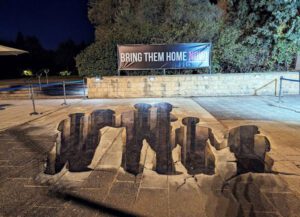The Hebrew University of Jerusalem held a commemoration of the one-month anniversary of the October 7th Massacre at the Edmond J. Safra Campus in Givat Ram.
During the solemn service, those in attendance paid respects to the memory of the victims and issued a resounding demand for the safe return of all hostages, whose well-being has been a source of concern and anguish for their families and the entire community.
Several speakers at the service offered words of comfort and solidarity to the affected families and the broader community. Family members provided personal insights and reflections at the event.
 “The trauma of the events of October 7th is deeply personal, especially for the families who have lost their loved ones. To the dear families affected, we extend our heartfelt condolences and offer our support, even though we recognize that we cannot fully alleviate your pain,” said Prof. Asher Cohen, President of Hebrew University. “For the State of Israel, this is a profound national tragedy that will leave a lasting mark on generations to come. Nevertheless, we hold on to hope—hope for the safe return of those who are being held hostage and faith in our nation’s resilience. Our hearts are united with the grieving families and may the memory of the departed be a source of blessing.”
“The trauma of the events of October 7th is deeply personal, especially for the families who have lost their loved ones. To the dear families affected, we extend our heartfelt condolences and offer our support, even though we recognize that we cannot fully alleviate your pain,” said Prof. Asher Cohen, President of Hebrew University. “For the State of Israel, this is a profound national tragedy that will leave a lasting mark on generations to come. Nevertheless, we hold on to hope—hope for the safe return of those who are being held hostage and faith in our nation’s resilience. Our hearts are united with the grieving families and may the memory of the departed be a source of blessing.”
The event provided a platform to offer support to those who continue to bear the emotional and psychological scars of the October 7th Massacre. Families, friends, and all those affected by these events found solace in the presence of a compassionate community that understands their pain and is here to provide the necessary support.
Other speakers shared the following remarks:
“Time has come to a standstill. We had lived with the belief that we coexisted with those we considered fellow human beings,” said Amir Zini, father of Niral Zini z”l, who was murdered in Kfar Gaza (nephew of Prof. Avi Zini, Dean of the Faculty of Dental Medicine). “But they were not human – they were monsters… In every home in the kibbutzim of the Gaza envelope, as part of an ideal, there were workers from Gaza. They, along with their sons and families, had been living and working amongst us for 20 to 30 years. They were provided with homes, slept here, and only returned to Gaza for vacations. In hindsight, it was revealed that these very ‘Gazaites’ from within our midst possessed the most accurate intelligence, and in some cases, were the first to breach the defenses towards Israel. The disillusionment is excruciating. Today, we all understand that what once was, cannot be what lies ahead. Our hearts are heavy as we pray for the safe return of the hostages.”
“We will rise, emerging from the depths of despair, bearing the solemn responsibility of honoring the countless lives that have been lost,” said Prof. Vered Vinitzky-Seroussi, Department of Sociology and Anthropology. “This undertaking is formidable, for the line of the departed stretches long, and the challenge of preserving their memories and stories is indeed daunting. Yet, remembrance is not a passive pursuit; it demands dedication and effort. While monuments and ceremonies hold significance, they alone are insufficient to etch the memories of those we’ve lost. To truly ensure that these individuals are never forgotten, we must find a personal place for each and every one of them in our hearts. For every man, woman and child has a name and it is incumbent upon us to preserve the memory of their lives, not merely their death.”
To meet the urgent needs of the university community impacted by the Hamas terror attacks, Hebrew University has launched the “We Are One” campaign in the U.S. and worldwide. The funds will be used to support students who have been called up in the reserves, residents of the Gaza envelope affected by the recent terrorist attack, and evacuees from the northern region as well as to provide medical, dental, and legal aid. Although the fund has reached $3.8 million (NIS 15 million) to date, the ongoing financial needs due to the war are steadily increasing.
The Hebrew University of Jerusalem is Israel’s premier academic and research institution. Serving over 23,000 students from 80 countries, the university produces nearly 40% of Israel’s civilian scientific research and has received over 11,000 patents. Faculty and alumni of the Hebrew University have won eight Nobel Prizes and a Fields Medal.
American Friends of the Hebrew University (AFHU) is a national, not-for-profit organization based in the United States. AFHU is headquartered in New York and has seven regional offices working in close partnership with the Hebrew University of Jerusalem. AFHU provides supporters, Hebrew University alumni, and the public with stimulating programs and events and organizes missions to Israel.


